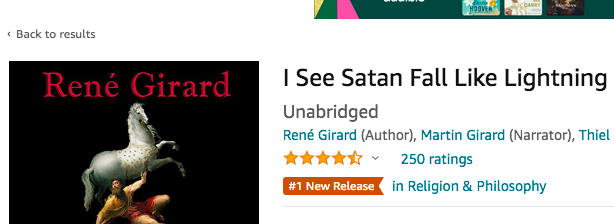A guest post from author Trevor Cribben Merrill:

I See Satan Fall Like Lightning (1999) is perhaps the most complete and compact statement of René Girard‘s sweeping theory of scapegoating violence and the shattering revelation it brings. Now it’s been released as an audiobook, thanks to the late French theorist’s son Martin Girard, a businessman who devoted many hours of his time to narrating the work. Though he had no prior experience as a voice actor or reader, early reviews have been glowing. The audiobook is available on Amazon here.
Girard’s work is more relevant than ever today. Surely no other thinker can supply such a convincing explanation for the existence of the Twitter retweet button. But beyond the theory’s obvious ability to shed light on our online vices, it resonates because of the central place that Girard gives to competition and rivalry in his thought. Whether you’re working to get funding for your start-up, attract readers to a Substack post, or snag a house in a hot real estate market, competition is a daily reality in our world, yet one that we often prefer not to think or speak about too openly, even as we furtively check the amazon.com ranking of a colleague’s newest release. Speaking of amazon.com rankings: the audiobook of I See Satan has been selling briskly. I hope it can continue to bring new readers to René’s work, and introduce them to his compelling account of Christian truth.
Earlier this month, Martin Girard and his wife Dee flew in from their home in Phoenix for a book launch and Q&A in Pasadena, CA to celebrate the I See Satan Fall Like Lightning (Thiel Foundation) release.
First published in France in 1999 as Je vois satan tomber comme l’éclair (Grasset), and then translated into English by James G. Williams and published by Orbis Books in 2001, the new audiobook was published last month on October 20.
The event was held at the Pasadena home of Nicole and Ray Tittmann, who have hosted a number of book launch events in the last few years (including a launch of my novel Minor Indignities). A sumptuous spread of hors d’oeuvres greeted a crowd that included incoming Cornerstone Forum director Alex Lessard and documentary filmmaker Sam Sorich, who was in town from Chicago and photographed the event.

Martin Girard was born in Bryn Mawr, Pennsylvania, the oldest of the three Girard children, while his father was teaching at Bryn Mawr College. He graduated from the University of Colorado at Boulder with a degree in political science. He then became an entrepreneur, working between Paris and the US, and eventually founded a start-up that he later sold to a Fortune 500 company. He and his wife Dee are avid skiers, and in recent years Martin has been delving deeply into his father’s work.
I interviewed him at the event, in a conversation that included Martin’s youth and early adulthood, and touched on key milestones in René’s career. Martin recalled the buzz of excitement at the time of the 1966 Johns Hopkins conference, and visits from Jean-Michel Oughourlian and Guy Lefort to the family’s home near Buffalo, New York, after his father took a professorship there and began writing the book that would eventually be published as Things Hidden since the Founding of the World. When Things Hidden was released in France to great critical and popular acclaim, Martin was in his early 20s and was working in France. Business associates were surprised to discover that Martin was, in fact, the son of the same René Girard they had heard interviewed on the radio or TV.
Martin described a childhood of French immersion, with frequent trips to and long stays in Avignon, and dinner table conversation conducted in French, even when the family was in the U.S. He and his younger brother sometimes chafed against their dad’s determination to immerse them in French culture and the French language, but later discovered that their bilingual and bicultural upbringing was a gift that opened up many opportunities and instilled a lifelong love of France.
Martin emphasized the key role his mother, Martha Girard, played in supporting his father’s work and career, as well as her role in teaching her children by example to avoid the drama and rivalries that René described in his works of literary theory. “Martha Girard came from a family with traditional Scotch-Irish, midwestern American values,” he said. “These values were an important part of the family’s dynamic and the children’s upbringing. René’s career and the exoticism of the French connection tend unjustly to overshadow the importance of the other side of the family, including the impact on René.”
Postscript: The Book Haven made a difference today! I See Satan Fall Like Lightning is the #1 new release in Religion & Philosophy.






December 9th, 2022 at 3:38 pm
The Louvin Brothers really should have built a song around that sentence.